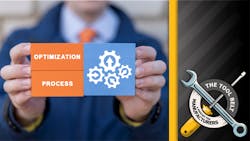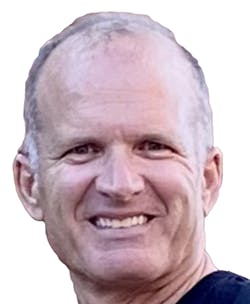Podcast: Kickstarting your plant’s reliability journey — Where are you now, and where do you want to be?
Joe Kuhn, CMRP, former plant manager, engineer, and global reliability consultant, is now president of Lean Driven Reliability LLC. He is the author of the book “Zero to Hero: How to Jumpstart Your Reliability Journey Given Today’s Business Challenges” and the creator of the Joe Kuhn YouTube Channel, which offers content on starting your reliability journey and achieving financial independence. Plant Services managing editor Anna Townshend recently spoke with Joe about the importance of leadership and how to establish a successful reliability culture at your plant.
PS: First off, we would love for them to learn a little bit more about you, your background, your experience, and what you're doing now, since your retirement from your first career.
JK: Okay, great. I'm married 35 years, and I have four adult children. They're all engineers, super proud of them. None of them are in the house. It's just my wife and I here. I began my career as a maintenance engineer back in 1987, and I worked for a large aluminum company, called Alcoa. Think of a large steel mill, one of those complexes, that's one mile by one mile. That's where I started off at, and then, I migrated into maintenance, leadership, and then production leadership. Then, I started running larger departments throughout my career. So I pretty quickly got out of engineering, but reliability maintenance was always the pinnacle to what you had to concentrate on at a heavy manufacturing facility (big rolling mill, coating lines, casting pits, smelter, power generation, just a lot of equipment) and a great place for reliability maintenance to cut your teeth on.
Then, I became a plant manager at three different locations. I worked as the location manager, one of my roles that I really cherished for four years. It was a role I set up during one of those performance review discussions you're having about what's your dream job, and where do you want to be. I was the global director for reliability and maintenance for Alcoa, and that allowed me to go to several countries, see best practices, help them with best practices. Helping them implement in their culture was challenging for me, being that English is my only language, but there’s a lot in common, like 99% in different organizations and cultures.
So then, I chose to retire at 54 years old after 32 years with Alcoa. The main driver for me is I had a message to get out regarding how to implement a reliability culture in a plant. I actually have an enormous amount of Lean training, like Six Sigma training, waste elimination training, along with a lot of reliability training, I'm a CMRP, so I really have these two different skill sets. And what I did is I was able to combine those to get results a lot faster than most people can in the traditional way. I learned about reliability, maintenance, best practices, and implementing them at a plant. It would take two to three years to set the foundation, learn the skills, get the processes in line, then if you can maintain that effort for 2, 3, 4 years, you could start to see an impact. Well, that just doesn't sell. And that's the purpose of my book was to say, you can't go into the plant manager and say, Hey, I have a great idea. Give me a million dollars, and then I'll give you 4 million back five years from now. That doesn't sell so I've got a process. I've got my book right here. It's on Amazon. But it covers how you get sustainable, scalable results very rapidly. I'm talking about, 30 days, 60 days, 90 days, how do you start to get those accomplishments and results. So I just wanted to get that word out. That's why I retired.
I had no intention of starting a YouTube channel, no intention at all. I wanted to go to conferences. I wanted to write. I wanted to do individual consulting. Then, COVID happened. And then, it opened up this door to virtual, and I'm reaching so many more people. I probably have maybe 250 videos on reliability and maintenance. And it's all set up in playlists, so you can look at it. And then I also expanded into retirement because somebody asked me, how old are you? Why do you retire? So I have a lot of retirement videos out there. Yesterday, I just made my 410th video, so I’ve got that YouTube channel, I'm really just from a reliability standpoint, trying to say, hey, here's another way, here's another way that you can solve the problem of needing short-term results, and also implementing best practices that may take some time. So that's why I retired.
PS: Great message. I think giving people the ability to start small and grow from there is so important, because they gasp at that big initial investment sometimes. Okay, well we're really glad to have you writing for us. And you're writing a column called Leadership in Action. I love this title because I think it's so easy to talk about leadership in intangible ways, but you're really good at giving very practical hands-on advice. And I think it's a theme that shines through in your book, too. I want to circle back to some of those book themes, but first, in general, what do you hope to accomplish with your column? Or what would you like to help readers with?
JK: Really, what I'm trying to do with the column is to get people to take action. Many times, you go to a conference, and conferences, they frustrate me a little bit, because, you get 800 people together, they go to conference, they're all inspired, then they go back on Monday, and it's just business as usual. What action can you take on Monday? So I tried to write where you can act upon them, not just gain knowledge and say, yeah, that's a good thing to do, but it won't work in my culture. So that's the message I'm trying to get out there, and that it's not that hard. I use a sports term. You don't have to go up and hit a home run every time. You don't have to have brilliant ideas; small steps taken every day make a huge difference. If you can make one change a week, a year later, you've made some dramatic change. So that's what I'm trying to do.
Also, why specifically leadership? This is the area in reliability and maintenance that I think there is just a giant vacuum, not trying to offend anybody listening here. But there's a giant vacuum in leadership and what I mean by leadership is taking risk. Taking risk for a better tomorrow. Simple example: you adopt predictive technologies in your plant, you do some IR routes, vibration routes, all those kinds of things to see failures earlier, but you keep all the PMs that are time based. And so, you’ve got your time-based PMs and you add something to that really out of fear. You don't drop this time-based maintenance away and have those people focus on problem solving or maybe reducing contractor spend, something like that, so its just risk averse. And I'm challenging people to lead in reliability and maintenance, because taking chances has a risk with it. Leaders know how to do that; managers manage stuff. So that's the intent, what the article is, to inspire action and to have a call to action for leaders.
Read the rest of the transcript
About the Author

Anna Townshend
managing editor
Anna Townshend has been a journalist and editor for almost 20 years. She joined Control Design and Plant Services as managing editor in June 2020. Previously, for more than 10 years, she was the editor of Marina Dock Age and International Dredging Review. In addition to writing and editing thousands of articles in her career, she has been an active speaker on industry panels and presentations, as well as host for the Tool Belt and Control Intelligence podcasts. Email her at [email protected].

